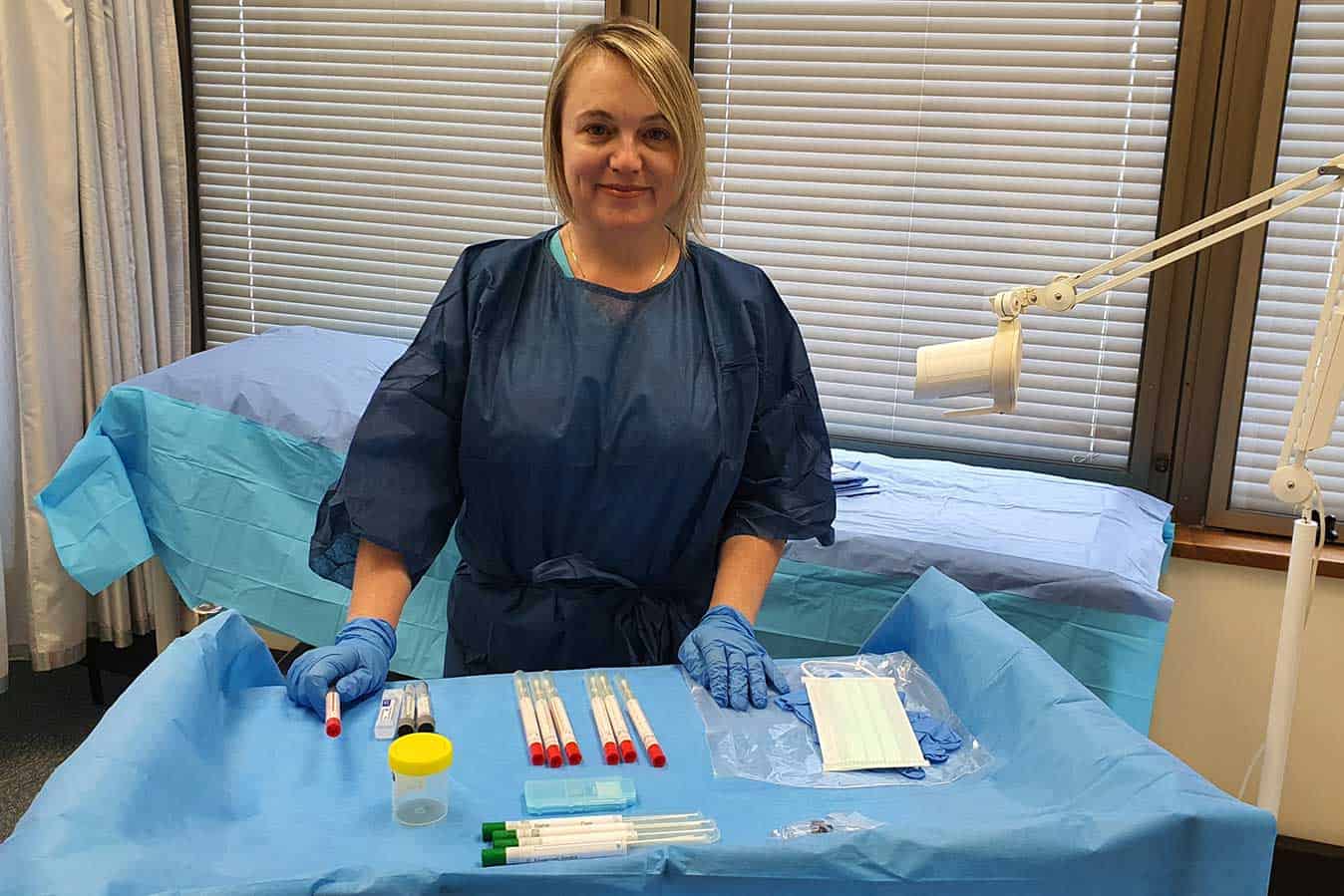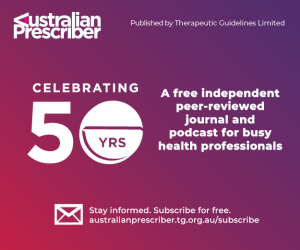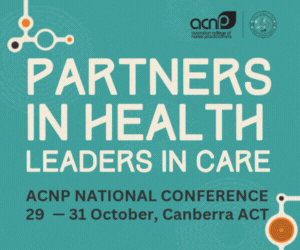A passion for nursing and keen interest in crime steered Tracey Markham towards a career in forensic nursing.
The unsung speciality, still in its infancy in Australia, is visible across a broad range of areas including correctional nursing, child abuse and neglect, domestic violence and sexual assault.
“Forensic nursing is the application of the nursing process and providing nursing care with a nexus to the criminal process,” Tracey explains.
Tracey’s qualifications include completing a Graduate Certificate in Forensic Nursing in 2004, followed by a Diploma in Mental Health at Flinders University in South Australia.
She transitioned from acute nursing into diverse forensic roles including correctional nursing, immigration, forensic mental health and Drug Court.
The roles were rewarding but her major goal remained becoming a sexual assault nurse examiner, however, no such position existed for nurses in South Australia at the time.
Undeterred, Tracey continued learning, undertaking certificates in sexual health, child sexual assault, domestic violence and sexual assault nursing in a bid to boost her knowledge and credentials.
She managed to get a foot in the door by starting out as an on-call crisis response worker at Yarrow Place Rape and Sexual Assault Service, which provides care to people who have been sexually assaulted.
She worked in the non-nursing role for seven years before securing a position at the service as a sexual assault forensic nurse and was finally able to practice her niche.
Since being appointed, Tracey has taken on training others from across the state in sexual assault forensic nursing and has continued to develop and improve the availability of forensic medical services.
She is currently Nurse Practitioner, Interpersonal Violence Forensic Nurse, at Yarrow Place.
The service is part of the Youth and Women’s Safety Wellbeing Division, consisting of four services with a specialist focus on trauma victims, healthcare and safety.
“I provide medical care and forensic evidence collection to people over the age of 16 who have been raped or sexually assaulted and/or have been affected by domestic violence,” Tracey says.
“This includes providing services 24/7 and an outreach model for victims of domestic violence. I provide education, support and lead metro and country nurses in the collection of forensic evidence and follow-up care.”
Tracey says forensic nurses need to be victim-focused and be able to provide compassionate care while remaining unbiased and non-judgemental.
Empathy, flexibility and resilience are also key attributes.
“It is important to be a trauma specialist as many people we see have not only experienced a recent trauma but also may have experienced cumulative traumas.
“It is vital to be adaptive and know how to build a quick rapport with a person, making them feel safe and supported in the clinical relationship. As a sexual assault examiner you are asking very intimate questions and may perform invasive anogenital examinations.”
Tracey says each case and person responds differently after experiencing personal trauma.
Some typical cases she’s been exposed to include forensic examinations of men and women, with people often engaging with Yarrow Place after being referred to by police, hospitals, GPs or crisis lines.
On arrival, Tracey and a social worker discuss each step of the Forensic Medical Examination (FME) process, gaining consent, informing people of their rights and allowing them to choose from available options regarding their forensic care and healthcare.
The client-centred approach allows victims to withdraw their consent to any part of the examination at any time.
“It is important to empower the victim as sexual assault and domestic violence are very disempowering and can be life-altering,” Tracey says.
“I am very mindful of their trauma and triggers. I listen, watch for signs and have an awareness of my own language. For example, I don’t say bed, I say examination table or table. I avoid commencing with the word why as it tends to imply blame.”
While uncovering the layers of assaults, Tracey says it’s important for her to keep in mind that she is a nurse and not a police officer.
This requires largely different information such as how the assault unfolded, what happened to the victim’s body, if they had any symptoms during the assault and or after, and how the assault ended.
A forensic examination can take anywhere from two to four hours and be emotionally exhausting for the victim.
The information helps Tracey develop a medical plan of how best to provide care, including where to look for injuries and find potential evidence.
Collecting evidence during an internal examination following sexual trauma can be difficult, Tracey says, as the use of a speculum or protoscope can be quite intrusive and distressing for many people after a sexual assault.
The head-to-toe physical examination includes a strangulation, injury, and mental health assessment, documentation and photographing injuries, collecting body swabs, urine, blood and clothing.
“What I have learnt through practise is the overriding priority must always be the patient’s wellbeing,” Tracey says.
“You need to be kind, patient, calm, unhurried and transparent with everything you are about to do.”
Tracey says helping victims in the aftermath of sexual assault return to some sense of normality delivers the biggest reward.
“Every day is different and I never know what is going to happen or how the person in front of me is going to be,” she says.
“I like giving power and control back to the person, providing them with options and allowing them to make informed decisions about their own body.
“For me it is about believing, recognising the individual trauma and responding by empowering them and leading them to the road to recovery.”
Tracey says forensic nursing in Australia has come a long way, pointing to the fact forensic nurses can now legally conduct intimate forensic procedures in sexual assault cases during the course of the forensic medical examination.
But she argues the specialty remains largely undervalued, with ongoing barriers including the lack of education for nurses looking to pursue forensic nursing leading to a shortfall in numbers.
Implementing education programs similar to the US and Canada would encourage more Australian nurses to consider pursuing forensic nursing.
“Evidence shows in the number of victims affected by interpersonal violence that there is a need for expansion of nurses working in this area to improve access to quality and cost-effective healthcare and advanced clinically focussed forensic nursing practice.









6 Responses
Fantastic work Tracey and such commitment to your passion is inspiring you are amazing! The work that you do is so important and it would be awesome for women affected by any form of abuse/assault/violence be treated with such professionalism and compassion. I would love to do a forensic science course its on my list! Great story thank you.
Thank you for sharing your career path. It’s hard to map out how to get there without a mentor. Thanks you also for the valuable work you do with sensitivity and transparency.
Wow! Amazing work Tracey. It sounds like an interesting field of work combining both the physical and mental health aspects of nursing together. I am would be interested to find out more about forensic nursing.
Sounds interesting. I thought forensic nursing is for the incarcerated population? Is not?
Fascinating work ! Well done . Thank you for sharing your experience.
Hi Tracy
Thank you for sharing your story. I would love to learn the steps and qualifications that you undertook to work in this field. Suzy 🙂